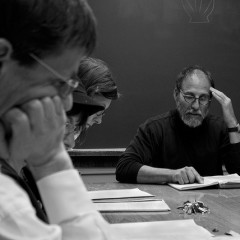The on-the-job training of pastors and other faith leaders in preventing and responding to child sexual abuse isn’t working – it is dangerous and all too often has devastating consequences. A problem with on-the-job training is that it allows for mistakes. That is okay when you are cooking hamburgers, but not when it involves the safety of children. It is not okay when it involves an abuse survivor who quietly suffers in the pew. It is not okay when it involves a perpetrator who exploits ignorance in order to victimize children and avoid getting caught.
Inadequately trained leaders are simply not equipped to protect the children under their care from offenders who spend a lifetime perfecting their ability to gain the trust of adults in order to access children. According to a national survey conducted by Christianity Today, 20% of Christian church leaders said they knew of at least one convicted sex offender who was attending or was a member of their church. This doesn’t include the sex offenders in their midst who have never been caught! Without pastors receiving substantive training about the dynamics of child sexual abuse and those who abuse, churches will never be safe places. On-the-job training all too often results in greater harm to the very individuals who are most in need of protection and help.
When it comes to responding to abuse, the Christian community has been shackled by inadequate preparation and training. For example, most pastors don’t know how to recognize abuse, report abuse, or to work with families impacted by abuse. I once read about a study of 143 clergy of various faiths in which 29% believed that actual evidence of abuse, as opposed to suspicion was necessary before a report could be made. Such a mistaken belief naturally results in the under-reporting of suspected abuse cases. This same study concluded that at some level, the 143 clergy participants impacted the lives of 23,841 children!
The issues related to the sexual abuse of children are many and complex. All the more reason that training must begin before-the-job, not on-the-job. Training must begin at the same time church leaders are being equipped to study scripture, preach, counsel, and administrate. What I am trying to say is that the equipping of pastors and church leaders on how to understand and address child sexual abuse must begin in our seminaries. And that’s exactly what we are going to do…
GRACE recently convened a team of Christian theologians, pastors, counselors, educators, and child protection professionals who have each demonstrated a commitment to protecting children and serving survivors. This historic committee has embraced the task of developing the first substantive seminary curriculum designed to educate and train Christian leaders on effective prevention and ministry responses to child sexual abuse. Our objective is to develop this curriculum in such a way that it can be easily adapted into virtually any seminary curriculum. Here is just a sampling of topics that this curriculum must cover if we are going to equip the next generation to help transform our churches into safe communities for children and survivors:
- Characteristics of child sexual abuse and its many permutations
- The profile and common behavioral characteristics of sexual offenders
- Common spiritual impacts of child sexual abuse
- A child’s perception of sexual abuse
- Biblical and theological foundations for child protection
- Best practices in child protection policies
- Mandated reporting laws
- Best practices in responding to active sexual abuse allegations in a Christian environment
- Basic understanding of the current techniques clinicians use when working with abuse victims
- Understanding of the purpose and value of professional mental health care for victims and perpetrators
- Characteristics of the abusing families
- Confronting past abuse within a church
I’ve never encountered an abuse victim who was grateful that their pastor had no training on how to prevent abuse. I’ve never encountered a parent who was relieved to learn that their pastor had no idea how to address the many spiritual questions associated with the sexual abuse of their child. I’ve never encountered a survivor who preferred that their pastor not understand the hell they have been stuck in for years as a result of being violated as a child.
What I have encountered are children who were victimized in churches that refused to acknowledge the importance of taking proactive steps to protect. What I have encountered are survivors and their families who struggle to find a pastor who is equipped or even interested in working through their deep spiritual questions associated with this horrific offense. What I have encountered are scores of survivors who spend years searching for someone inside the church who understands their dark journey and is willing to walk with them. Most of these aching souls eventually lose hope, stop searching, and walk away.
I realize that not all pastors and church leaders attend seminary. However, this curriculum is a major step in the right direction. A direction that will lead to a Christian community that better protects children and is able to connect with survivors and walk alongside them.
There is no reason any of us should accept the status quo of on-the-job training when it comes to the protection and care of God’s children. We can do better. We must do better. The invaluable lives of those made in God’s image deserve nothing less.
Stay tuned…







